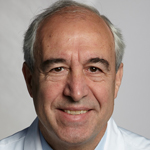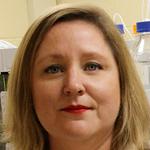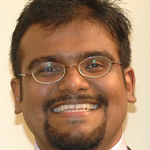

 Ioanna Andreadou, Ph.D.- Associate Professor of Pharmacology, Faculty of Pharmacy, National and Kapodistrian University of Athens, Greece. She studied Pharmacy at Aristotel’s University of Thessaloniki, she obtained her PhD from the same Department and she pursued a postdoctoral fellowship in Leiden Amsterdam Center for Drug Research in the field of Molecular Pharmacology and Toxicology. Her research interests are focused on cardiovascular pharmacology and mainly on cardioprotection triggered by ischemic and pharmacological conditioning. Her current work addresses the effect of SGLT2 inhibitors on ischemia/reperfusion injury in animals with diet-induced metabolic syndrome, and in healthy animals in absence of comorbidities and the underlying mechanism of action. She is a Working Group leader in the Cost Action EU-Cardioprotection.
Ioanna Andreadou, Ph.D.- Associate Professor of Pharmacology, Faculty of Pharmacy, National and Kapodistrian University of Athens, Greece. She studied Pharmacy at Aristotel’s University of Thessaloniki, she obtained her PhD from the same Department and she pursued a postdoctoral fellowship in Leiden Amsterdam Center for Drug Research in the field of Molecular Pharmacology and Toxicology. Her research interests are focused on cardiovascular pharmacology and mainly on cardioprotection triggered by ischemic and pharmacological conditioning. Her current work addresses the effect of SGLT2 inhibitors on ischemia/reperfusion injury in animals with diet-induced metabolic syndrome, and in healthy animals in absence of comorbidities and the underlying mechanism of action. She is a Working Group leader in the Cost Action EU-Cardioprotection.
 Juan Jose Badimon, Ph.D.- Professor of Medicine and Director of the Atherothrombosis Research Unit at the Mount Sinai Heart, Icahn School of Medicine at Mount Sinai, New York.
His research interests are focused on pathogenesis and treatment of atherothrombosis and cardiovascular diseases in general. He has been involved in the use of non-invasive imaging modalities (MRI and CT) for detecting early lesions as well as monitoring the effectiveness of therapeutic approaches in arteriosclerosis and thrombosis. The non-invasive imaging modalities are also a major asset in the on-going studies on the pathogenesis of LV remodeling post-MI. We are now interested in a better knowledge of the molecular pathways involved in the LV remodeling as well as identification and development of therapeutic strategies.
Juan Jose Badimon, Ph.D.- Professor of Medicine and Director of the Atherothrombosis Research Unit at the Mount Sinai Heart, Icahn School of Medicine at Mount Sinai, New York.
His research interests are focused on pathogenesis and treatment of atherothrombosis and cardiovascular diseases in general. He has been involved in the use of non-invasive imaging modalities (MRI and CT) for detecting early lesions as well as monitoring the effectiveness of therapeutic approaches in arteriosclerosis and thrombosis. The non-invasive imaging modalities are also a major asset in the on-going studies on the pathogenesis of LV remodeling post-MI. We are now interested in a better knowledge of the molecular pathways involved in the LV remodeling as well as identification and development of therapeutic strategies.
Dr. Badimon has published more than 370 peer-reviewed articles in atherothrombosis, imaging and cardiovascular diseases in general. He serves as reviewer for more than 10 top journals in thrombosis and cardiovascular diseases.
 Heiko Bugger received his MD degree at the University of Freiburg in 2005. Between 2005 and 2009, he accomplished a postdoctoral fellowship at the University of Utah in the group of E. Dale Abel. From 2009 to 2018, he served as a clinician in the Department of Cardiology at the University of Freiburg, achieved his board certifications for internal medicine and cardiology, and completed his habilitation in 2016. In 2018, he moved to Graz, Austria, to join the Department of Cardiology at the Medical University of Graz as an interventional cardiologist. Since 2009, he is head of a research group, which focuses on the regulation of cardiac energetics in heart failure, ischemia reperfusion, and diabetic cardiomyopathy. Dr. Bugger received several awards, including the Research Award “der herzkranke Diabetiker” by the German Diabetes Foundation in 2011 and the Ludwig-Heilmeyer-Award in Silver in 2012. He is the current chair of the working group “Myocardial function and energetics” of the German Cardiac Society and serves as a reviewer for several research institutions (German Research Foundation (DFG), European Research Council (ERC)) and scientific journals.
Heiko Bugger received his MD degree at the University of Freiburg in 2005. Between 2005 and 2009, he accomplished a postdoctoral fellowship at the University of Utah in the group of E. Dale Abel. From 2009 to 2018, he served as a clinician in the Department of Cardiology at the University of Freiburg, achieved his board certifications for internal medicine and cardiology, and completed his habilitation in 2016. In 2018, he moved to Graz, Austria, to join the Department of Cardiology at the Medical University of Graz as an interventional cardiologist. Since 2009, he is head of a research group, which focuses on the regulation of cardiac energetics in heart failure, ischemia reperfusion, and diabetic cardiomyopathy. Dr. Bugger received several awards, including the Research Award “der herzkranke Diabetiker” by the German Diabetes Foundation in 2011 and the Ludwig-Heilmeyer-Award in Silver in 2012. He is the current chair of the working group “Myocardial function and energetics” of the German Cardiac Society and serves as a reviewer for several research institutions (German Research Foundation (DFG), European Research Council (ERC)) and scientific journals.
 Professor Kieran Clarke joined the Department of Biochemistry at the University of Oxford in 1991. Her research is focussed on how diet alters energy metabolism in human heart, brain and skeletal muscle. Specifically, her interest in physical performance and cognitive function has led to the development of a fourth food group, a ketone ester called ΔG®, that improves endurance performance in athletes and could be used for the management of common metabolic diseases, such as type 2 diabetes, heart failure and Alzheimer’s disease.
Professor Kieran Clarke joined the Department of Biochemistry at the University of Oxford in 1991. Her research is focussed on how diet alters energy metabolism in human heart, brain and skeletal muscle. Specifically, her interest in physical performance and cognitive function has led to the development of a fourth food group, a ketone ester called ΔG®, that improves endurance performance in athletes and could be used for the management of common metabolic diseases, such as type 2 diabetes, heart failure and Alzheimer’s disease.
Professor Clarke has a BSc (Hons) from Flinders University in Adelaide and a PhD in Biochemistry from the University of Queensland in Australia. Prior to her appointment in Oxford, she worked for the National Research Council of Canada in Ottawa after her postdoctoral fellowship at Harvard University Medical School in Boston.
 Dr. L. Ashley Cowart is Professor of Biochemistry at Virginia Commonwealth University, where she also serves as the director of the VCU Lipidomics and Metabolomics core facility. She received her PhD in biochemistry from Vanderbilt University in 2001. She completed postdoctoral studies at the Medical University of South Carolina in the laboratory of Dr. Yusuf Hannun, where she studied stress-induced sphingolipid metabolism and signaling, developing new computational strategies to gain understanding of how sphingolipids regulated gene expression. She joined the faculty in 2005 and embarked on research to address how metabolic disease alters sphingolipid metabolism in critical tissues including skeletal muscle, heart, adipose tissue, and liver, and how alterations in sphingolipid metabolism may mediate some pathological outcomes of obesity in these tissues. During these years her work addressed specific pathways of ceramide generation that regulated cardiomyocyte mitochondrial function, autophagy, and apoptosis. Her current work addresses the molecular mechanisms of sphingolipid-regulated autophagy, roles of sphingolipids in inflammation and ischemic injury, and novel pathways of biosynthesis of a class of atypical sphingolipids that have distinct biological functions than canonical sphingolipids. She has been continuously extramurally funded since 2005, is a permanent member of the National Institutes of Health Center for Scientific Review Myocardial Ischemia and Metabolism study section, and has published over 50 manuscripts in journals including the Journal of Biological Chemistry, FASEB J, and the Journal of Clinical Investigation. She has attended each meeting of the Society for Heart and Vascular Metabolism since 2011 and has further supported the organization through chairing the meeting in 2018.
Dr. L. Ashley Cowart is Professor of Biochemistry at Virginia Commonwealth University, where she also serves as the director of the VCU Lipidomics and Metabolomics core facility. She received her PhD in biochemistry from Vanderbilt University in 2001. She completed postdoctoral studies at the Medical University of South Carolina in the laboratory of Dr. Yusuf Hannun, where she studied stress-induced sphingolipid metabolism and signaling, developing new computational strategies to gain understanding of how sphingolipids regulated gene expression. She joined the faculty in 2005 and embarked on research to address how metabolic disease alters sphingolipid metabolism in critical tissues including skeletal muscle, heart, adipose tissue, and liver, and how alterations in sphingolipid metabolism may mediate some pathological outcomes of obesity in these tissues. During these years her work addressed specific pathways of ceramide generation that regulated cardiomyocyte mitochondrial function, autophagy, and apoptosis. Her current work addresses the molecular mechanisms of sphingolipid-regulated autophagy, roles of sphingolipids in inflammation and ischemic injury, and novel pathways of biosynthesis of a class of atypical sphingolipids that have distinct biological functions than canonical sphingolipids. She has been continuously extramurally funded since 2005, is a permanent member of the National Institutes of Health Center for Scientific Review Myocardial Ischemia and Metabolism study section, and has published over 50 manuscripts in journals including the Journal of Biological Chemistry, FASEB J, and the Journal of Clinical Investigation. She has attended each meeting of the Society for Heart and Vascular Metabolism since 2011 and has further supported the organization through chairing the meeting in 2018.
 Roselle’s current research is based on the integration of various aspects of genomics, proteomics and metabolomics to deepen our understanding of pathophysiology of metabolic diseases. During her PhD in Nutrition at the Université de Montréal using isolated working mouse heart perfusion combined with metabolic fluxes analyses she highlighted unexpected metabolic and electrophysiological alterations associated with fatty acid oxidation disorders. She then pursued a fellowship at the Pôle de Recherche Cardiovasculaire at the Université catholique de Louvain in Belgium. Her work provided novel insights into mechanisms linking AMPK signaling with the development of cardiac hypertrophy, and with the emergence of O-GlcNAcylation as a novel putative therapeutic target. This was followed by a fellowship in the Laboratory for Genetics and Genomic Medicine at the Montreal Heart Institute in order to develop and apply hiPSC-cardiomyocyte models with the express purpose of demonstrating causality for genes and genetic variants identified in whole exome sequencing studies if arrhythmias. In the process, she identified a novel fatal arrhythmic disorder and a potential causal link with lipid metabolism. Her current work builds upon this experience in order to use hiPS-derived models to understand tissue-specific differences in the molecular manifestations of mutations, in order to uncover protective mechanisms that could be exploited for future therapeutic development. Roselle collaborates with other researchers locally and internationally, in academia and industry. She has an expertise in cutting edge technologies and has an innovative research program which is well anchored in basic science and that has a direct link to the clinic.
Roselle’s current research is based on the integration of various aspects of genomics, proteomics and metabolomics to deepen our understanding of pathophysiology of metabolic diseases. During her PhD in Nutrition at the Université de Montréal using isolated working mouse heart perfusion combined with metabolic fluxes analyses she highlighted unexpected metabolic and electrophysiological alterations associated with fatty acid oxidation disorders. She then pursued a fellowship at the Pôle de Recherche Cardiovasculaire at the Université catholique de Louvain in Belgium. Her work provided novel insights into mechanisms linking AMPK signaling with the development of cardiac hypertrophy, and with the emergence of O-GlcNAcylation as a novel putative therapeutic target. This was followed by a fellowship in the Laboratory for Genetics and Genomic Medicine at the Montreal Heart Institute in order to develop and apply hiPSC-cardiomyocyte models with the express purpose of demonstrating causality for genes and genetic variants identified in whole exome sequencing studies if arrhythmias. In the process, she identified a novel fatal arrhythmic disorder and a potential causal link with lipid metabolism. Her current work builds upon this experience in order to use hiPS-derived models to understand tissue-specific differences in the molecular manifestations of mutations, in order to uncover protective mechanisms that could be exploited for future therapeutic development. Roselle collaborates with other researchers locally and internationally, in academia and industry. She has an expertise in cutting edge technologies and has an innovative research program which is well anchored in basic science and that has a direct link to the clinic.
 Lisa Heather is an Associate Professor and British Heart Foundation Fellow at the University of Oxford. She completed an undergraduate degree in Medical Biochemistry at the University of Surrey. She studied for her DPhil at the Department of Physiology, Anatomy and Genetics at the University of Oxford, investigating the effects of heart failure on cardiac substrate metabolism.
Lisa Heather is an Associate Professor and British Heart Foundation Fellow at the University of Oxford. She completed an undergraduate degree in Medical Biochemistry at the University of Surrey. She studied for her DPhil at the Department of Physiology, Anatomy and Genetics at the University of Oxford, investigating the effects of heart failure on cardiac substrate metabolism.
In 2011, Lisa was awarded a RD Lawrence Early Career Fellowship by Diabetes UK. Her group investigate the metabolic abnormalities that occur in the diabetic heart, and whether these contribute to impaired contractility of the heart. In 2018 Lisa was awarded a British Heart Foundation Basic Science Intermediate Fellowship. Her current research is focused on novel approaches to manipulate cardiac metabolism, with particular interest in hypoxic signalling pathways and fatty acids. She was the recipient of the Innovators in Diabetes Award in 2012, Lilly Diabetes Award in 2013 and the Bayliss-Starling Award from the Physiological Society in 2016.
 For his PhD project, Dr. Houten focused on the isoprenoid and cholesterol biosynthesis pathway. He discovered that a deficiency of mevalonate kinase causes hyper-IgD syndrome, one of the periodic fever syndromes, and conducted studies to understand the consequences of this defect on cellular isoprenoid metabolism. As postdoctoral fellow, Dr. Houten studied mechanisms underlying the transcriptional control of metabolism in different mouse models. His research focused on signaling events elicited by metabolites and nuclear hormone receptors. He characterized metabolic effects of bile acids and defined a novel bile acid signaling pathway that affects energy homeostasis. For his second postdoctoral fellowship, Dr. Houten combined his interest in regulation of metabolic processes and human genetics. He initiated a line of research on the pathophysiology of mitochondrial fatty acid oxidation defects and was promoted to Principal Investigator. He applied state-of-the-art phenotyping methods to mouse models for mitochondrial fatty acid oxidation defects, which yielded new and unexpected insights in the pathophysiology of hypoglycemia and cardiac hypertrophy associated with these disorders. Dr. Houten is currently a tenured Associate Professor (Department of Genetics and Genomic Sciences, Icahn School of Medicine at Mount Sinai). He explores pathophysiological mechanisms in disorders of fatty acid oxidation and lysine degradation with the ultimate aim to develop new therapies.
For his PhD project, Dr. Houten focused on the isoprenoid and cholesterol biosynthesis pathway. He discovered that a deficiency of mevalonate kinase causes hyper-IgD syndrome, one of the periodic fever syndromes, and conducted studies to understand the consequences of this defect on cellular isoprenoid metabolism. As postdoctoral fellow, Dr. Houten studied mechanisms underlying the transcriptional control of metabolism in different mouse models. His research focused on signaling events elicited by metabolites and nuclear hormone receptors. He characterized metabolic effects of bile acids and defined a novel bile acid signaling pathway that affects energy homeostasis. For his second postdoctoral fellowship, Dr. Houten combined his interest in regulation of metabolic processes and human genetics. He initiated a line of research on the pathophysiology of mitochondrial fatty acid oxidation defects and was promoted to Principal Investigator. He applied state-of-the-art phenotyping methods to mouse models for mitochondrial fatty acid oxidation defects, which yielded new and unexpected insights in the pathophysiology of hypoglycemia and cardiac hypertrophy associated with these disorders. Dr. Houten is currently a tenured Associate Professor (Department of Genetics and Genomic Sciences, Icahn School of Medicine at Mount Sinai). He explores pathophysiological mechanisms in disorders of fatty acid oxidation and lysine degradation with the ultimate aim to develop new therapies.
 Thomas Krieg obtained his MD in Freiburg and started his clinical training in cardiology in Ludwigshafen and at the University of Greifswald. From 2001 to 2004 he was post-doc in Jim Downey’s lab in Mobile, AL where he started his research in cardiac ischaemia/reperfusion (IR) injury. After his Habilitation in cardiology in 2006 he took a post as University Lecturer and Honorary Consultant Physician in Acute Medicine at the University of Cambridge in 2009. Due to a very fruitful collaboration with Mike Murphy at the Mitochondrial Biology Unit in Cambridge, his research focus shifted towards mitochondrial metabolomic changes during IR injury. Mike and Thomas discovered many important mechanisms of mitochondrial metabolomics and redox regulation, including the rise of succinate during ischaemia and its role in reverse electron transport at complex I. Thomas is also Teaching Associate at Gonville and Caius College and lead of the Clinical Pharmacology curriculum at Cambridge.
Thomas Krieg obtained his MD in Freiburg and started his clinical training in cardiology in Ludwigshafen and at the University of Greifswald. From 2001 to 2004 he was post-doc in Jim Downey’s lab in Mobile, AL where he started his research in cardiac ischaemia/reperfusion (IR) injury. After his Habilitation in cardiology in 2006 he took a post as University Lecturer and Honorary Consultant Physician in Acute Medicine at the University of Cambridge in 2009. Due to a very fruitful collaboration with Mike Murphy at the Mitochondrial Biology Unit in Cambridge, his research focus shifted towards mitochondrial metabolomic changes during IR injury. Mike and Thomas discovered many important mechanisms of mitochondrial metabolomics and redox regulation, including the rise of succinate during ischaemia and its role in reverse electron transport at complex I. Thomas is also Teaching Associate at Gonville and Caius College and lead of the Clinical Pharmacology curriculum at Cambridge.
 Prof. Michael Lehrke holds specialisation in internal medicine, cardiology, endocrinology and intensive care medicine and is attending physician, head of the lipid clinic and interventional cardiologist at the department of cardiology at the University of Aachen/Germany. He is the past chair of the working group heart and diabetes of the German Society of cardiology and an active member of German Society of Diabetology. He is also a member of various societies including ESC.
Prof. Michael Lehrke holds specialisation in internal medicine, cardiology, endocrinology and intensive care medicine and is attending physician, head of the lipid clinic and interventional cardiologist at the department of cardiology at the University of Aachen/Germany. He is the past chair of the working group heart and diabetes of the German Society of cardiology and an active member of German Society of Diabetology. He is also a member of various societies including ESC.
Prof. Lehrke completed his clinical and research training in diabetes and endocrinology at the University of Munich and his clinical training in cardiology at the University of Aachen. He graduated in Medicine from the University of Mainz.
Prof. Lehrke has been involved in a number of clinical trials and published widely on topics related to metabolism, diabetes, atherosclerosis and cardiomyopathy. He has authored over 62 publications in international peer-reviewed journals such as Cell metabolism, PLOS Medicine, JACC, Diabetes, DOM, Molecular Metabolism. As an active lecturer, he has presented at many national and international conferences including the ADA and EASD Scientific Session.
 Joost J.F.P. Luiken studied biology at the University of Utrecht and graduated in 1988, specialized in biochemistry and molecular genetics. After a PhD-project on liver metabolism at the Univeristy of Amsterdam, he started working at Maastricht University as post-doc in November 1994 to study the role of fatty acid transporters in the heart.
Joost J.F.P. Luiken studied biology at the University of Utrecht and graduated in 1988, specialized in biochemistry and molecular genetics. After a PhD-project on liver metabolism at the Univeristy of Amsterdam, he started working at Maastricht University as post-doc in November 1994 to study the role of fatty acid transporters in the heart.
Upon his initial discoveries that (i) CD36 is the predominant fatty acid transporter in the heart, and (ii) CD36 activity is regulated by reversible translocation from intracellular stores (endosomes) to the sarcolemma, Joost Luiken discovered that in the rodent diabetic heart CD36 is permanently relocated from the endosomes to the sarcolemma without changes in expression. The increase in cell surface abundance of CD36 will lead to chronically increased myocardial fatty acid uptake, lipid accumulation, insulin resistance, and finally cardiac dysfunction. Further research on the causes of this aberrant CD36 subcellular localization revealed that alterations in the CD36-dedicated trafficking machinery are responsible for sarcolemmal CD36 relocation. Because the CD36-dedicated trafficking machinery is completely unexplored, his recent studies focused on screening for and identifying CD36-dedicated trafficking proteins, and their altered functioning in the diabetic heart.
 Christoph Maack received his MD at the University of Cologne (Germany) in 2000. Between 2000 and 2017, he worked at the Department of Cardiology at the University of the Saarland in Homburg, Germany, and from 2002-2005 as a post-doctoral research assistant in the lab of Brian O’Rourke at the Department of Cardiology at Johns Hopkins University in Baltimore, MD, US. In 2017, he became Director of the Comprehensive Heart Failure Center (CHFC) at the University Clinic in Würzburg, Germany, where he also chairs the Department of Translational Science. His work focuses on cellular defects in chronic heart failure, with a special emphasis on the mechanisms of contractile, mitochondrial and metabolic dysfunction in heart failure.
For his work, Maack received several awards, such as the Albert-Fraenkel- (2014) and the Arthur-Weber Awards (2015) of the German Cardiac Society, respectively. He served on the Board of the Heart Failure Association (HFA) of the European Society of Cardiology (ESC) from 2010-2016, where he was the Coordinator of the Translational Research Committee (2011-2014) and the Chair of the Basic Science section (2014-2016). In 2018, he entered the Council of the International Society of Heart Research (ISHR), European Section (ES).
Christoph Maack received his MD at the University of Cologne (Germany) in 2000. Between 2000 and 2017, he worked at the Department of Cardiology at the University of the Saarland in Homburg, Germany, and from 2002-2005 as a post-doctoral research assistant in the lab of Brian O’Rourke at the Department of Cardiology at Johns Hopkins University in Baltimore, MD, US. In 2017, he became Director of the Comprehensive Heart Failure Center (CHFC) at the University Clinic in Würzburg, Germany, where he also chairs the Department of Translational Science. His work focuses on cellular defects in chronic heart failure, with a special emphasis on the mechanisms of contractile, mitochondrial and metabolic dysfunction in heart failure.
For his work, Maack received several awards, such as the Albert-Fraenkel- (2014) and the Arthur-Weber Awards (2015) of the German Cardiac Society, respectively. He served on the Board of the Heart Failure Association (HFA) of the European Society of Cardiology (ESC) from 2010-2016, where he was the Coordinator of the Translational Research Committee (2011-2014) and the Chair of the Basic Science section (2014-2016). In 2018, he entered the Council of the International Society of Heart Research (ISHR), European Section (ES).
 Mathias Mericskay, PhD is an INSERM Director of Research leading a research group at the Faculty of Pharmacy of University Paris-Sud, and a member of the board of directors of the research working group at the French Society of Cardiology. Dr Mericskay earned his Ph.D in molecular and cellular developmental biology at the University Denis Diderot from Paris in 1999. His thesis on the regulation and function of the desmin gene in the cardiovascular system was under the mentorship of Professor Denise Paulin at the Pasteur Institute. He did his postdoctoral training from 2000 to 2003 at the Mount Sinai Hospital in New York in the group of Professor David Sassoon, working on Wnt signaling. Dr Mericskay was recruited as an INSERM investigator in 2003 and developed a research on the role of the Serum Response Factor (SRF) as a transcriptional regulator of cardiac and smooth muscle genes, focusing notably on the impact of SRF deficiency on the development of dilated cardiomyopathy. His results pointed to the central role of SRF in the co-regulation of microRNAS and genes regulating contraction, energy transfer and calcium flux in cardiac cells. More recently his group identified defects in NAD coenzyme metabolism in the failing heart and has continued work on the development of a metabolic therapy of heart failure based on the regeneration of myocardial NAD pools.
Mathias Mericskay, PhD is an INSERM Director of Research leading a research group at the Faculty of Pharmacy of University Paris-Sud, and a member of the board of directors of the research working group at the French Society of Cardiology. Dr Mericskay earned his Ph.D in molecular and cellular developmental biology at the University Denis Diderot from Paris in 1999. His thesis on the regulation and function of the desmin gene in the cardiovascular system was under the mentorship of Professor Denise Paulin at the Pasteur Institute. He did his postdoctoral training from 2000 to 2003 at the Mount Sinai Hospital in New York in the group of Professor David Sassoon, working on Wnt signaling. Dr Mericskay was recruited as an INSERM investigator in 2003 and developed a research on the role of the Serum Response Factor (SRF) as a transcriptional regulator of cardiac and smooth muscle genes, focusing notably on the impact of SRF deficiency on the development of dilated cardiomyopathy. His results pointed to the central role of SRF in the co-regulation of microRNAS and genes regulating contraction, energy transfer and calcium flux in cardiac cells. More recently his group identified defects in NAD coenzyme metabolism in the failing heart and has continued work on the development of a metabolic therapy of heart failure based on the regeneration of myocardial NAD pools.
 Julian Mustroph attended medical school at the University of Göttingen. He finished his thesis "SR Ca2+-leak and disordered excitation-contraction coupling as the basis for arrhythmogenic and negative inotropic effects of acute ethanol exposure“ at the University of Regensburg, where he is currently a physician in the Department of Internal Medicine II. Julian has presented his research at the American Heart association’s Scientific sessions and the European Society of Cardiology, and has received multiple awards for his presentations and his research.
Julian Mustroph attended medical school at the University of Göttingen. He finished his thesis "SR Ca2+-leak and disordered excitation-contraction coupling as the basis for arrhythmogenic and negative inotropic effects of acute ethanol exposure“ at the University of Regensburg, where he is currently a physician in the Department of Internal Medicine II. Julian has presented his research at the American Heart association’s Scientific sessions and the European Society of Cardiology, and has received multiple awards for his presentations and his research.
 Passier’s research focuses on cardiac disease modelling based on human pluripotent stem cells (both embryonic and induced pluripotent stem cells). Furthermore, the Passier group aims to unravel key molecular mechanisms during cardiac differentiation, development and disease. In recent years, defined protocols for generating specialized cardiac cells and cardiovascular progenitors cells from human pluripotent stem cells have been established in his group. Passier has extensive experience on cardiotoxicity and cardiac disease using hPSC-derived cardiomyocytes based on electrophysiological, contractile, morphological, molecular and biochemical assays (either at the single cell level or high throughput). Since 2002 he has worked with human pluripotent stem cells and their differentiation to cardiac cells. He was appointed as Professor and Chair of the Department of Applied Stem Cell Technologies in 2015, University of Twente (UT) and as Professor at the Department of Anatomy and Embryology, Leiden University Medical Centre (LUMC). At the UT and LUMC he combines human stem cell technologies and micro-engineering technologies in order to build highly advanced “heart-on-chip” systems (either 2D or 3D) for modelling cardiac disease, drug screening and regenerative medicine. In addition, cardiomyocyte biology, function and toxicity will be studied using multifunctional advanced and/or high-throughput technologies. Passier is leader of research theme “heart disease” of the Institute for Human Organ and Disease Model Technologies (hDMT), which has the mission – in collaboration with top research groups and private partners - to develop human model systems leading to personalized medicine, increase safety and efficacy for new drugs, reduce the time-to-market and costs of drug development and to reduce and replace animal testing. Passier is a co-founder of Pluriomics (2011) and River BioMedics (2018). In 2017 Ncardia was formed following the merger of Pluriomics and Axiogenesis.
Passier’s research focuses on cardiac disease modelling based on human pluripotent stem cells (both embryonic and induced pluripotent stem cells). Furthermore, the Passier group aims to unravel key molecular mechanisms during cardiac differentiation, development and disease. In recent years, defined protocols for generating specialized cardiac cells and cardiovascular progenitors cells from human pluripotent stem cells have been established in his group. Passier has extensive experience on cardiotoxicity and cardiac disease using hPSC-derived cardiomyocytes based on electrophysiological, contractile, morphological, molecular and biochemical assays (either at the single cell level or high throughput). Since 2002 he has worked with human pluripotent stem cells and their differentiation to cardiac cells. He was appointed as Professor and Chair of the Department of Applied Stem Cell Technologies in 2015, University of Twente (UT) and as Professor at the Department of Anatomy and Embryology, Leiden University Medical Centre (LUMC). At the UT and LUMC he combines human stem cell technologies and micro-engineering technologies in order to build highly advanced “heart-on-chip” systems (either 2D or 3D) for modelling cardiac disease, drug screening and regenerative medicine. In addition, cardiomyocyte biology, function and toxicity will be studied using multifunctional advanced and/or high-throughput technologies. Passier is leader of research theme “heart disease” of the Institute for Human Organ and Disease Model Technologies (hDMT), which has the mission – in collaboration with top research groups and private partners - to develop human model systems leading to personalized medicine, increase safety and efficacy for new drugs, reduce the time-to-market and costs of drug development and to reduce and replace animal testing. Passier is a co-founder of Pluriomics (2011) and River BioMedics (2018). In 2017 Ncardia was formed following the merger of Pluriomics and Axiogenesis.
 Dr. Thomas Pulinilkunnil is an Associate Professor at the Department of Biochemistry and Molecular Biology, Dalhousie University, Canada, since 2012. Dr. Pulinilkunnil earned his Ph.D. in the laboratory of Dr. Brian Rodrigues, at the University of British Columbia, Vancouver, Canada. Dr. Pulinilkunnil pursued two postdoctoral fellowships in laboratories of Dr. Barbara Kahn and Dr. Jason Dyck at Harvard Medical School and the University of Alberta respectively. Dr. Pulinilkunnil is frequently invited to speak nationally and internationally on his basic and translational research in cardiac energy metabolism. Dr. Pulinilkunnil is a leading expert in metabolic disease phenotyping. Dr. Pulinilkunnil’s research program examines the cause and impact of disrupted cardiac energy metabolism and function. Pulinilkunnil lab employs a multispecies approach to identify novel mediators and examine molecular mechanisms by which hormones and nutrients influence lysosomal function to alter autophagy and mitochondrial energy metabolism in the heart. Dr. Pulinilkunnil is a recipient of several awards including the Diabetes Canada Scholar Award in 2016. Dr. Pulinilkunnil’s research program is funded by NSERC, Diabetes Canada, DMRF, and NBHRF. Dr. Pulinilkunnil has published more than 60 research papers in prominent journals such as Nature, Nature Medicine, PNAS, Diabetes, Circulation, JMCC, CVR and JLR. Dr. Pulinilkunnil is a passionate mentor and an active teacher.
Dr. Thomas Pulinilkunnil is an Associate Professor at the Department of Biochemistry and Molecular Biology, Dalhousie University, Canada, since 2012. Dr. Pulinilkunnil earned his Ph.D. in the laboratory of Dr. Brian Rodrigues, at the University of British Columbia, Vancouver, Canada. Dr. Pulinilkunnil pursued two postdoctoral fellowships in laboratories of Dr. Barbara Kahn and Dr. Jason Dyck at Harvard Medical School and the University of Alberta respectively. Dr. Pulinilkunnil is frequently invited to speak nationally and internationally on his basic and translational research in cardiac energy metabolism. Dr. Pulinilkunnil is a leading expert in metabolic disease phenotyping. Dr. Pulinilkunnil’s research program examines the cause and impact of disrupted cardiac energy metabolism and function. Pulinilkunnil lab employs a multispecies approach to identify novel mediators and examine molecular mechanisms by which hormones and nutrients influence lysosomal function to alter autophagy and mitochondrial energy metabolism in the heart. Dr. Pulinilkunnil is a recipient of several awards including the Diabetes Canada Scholar Award in 2016. Dr. Pulinilkunnil’s research program is funded by NSERC, Diabetes Canada, DMRF, and NBHRF. Dr. Pulinilkunnil has published more than 60 research papers in prominent journals such as Nature, Nature Medicine, PNAS, Diabetes, Circulation, JMCC, CVR and JLR. Dr. Pulinilkunnil is a passionate mentor and an active teacher.
 Dr. Matthieu Ruiz obtained his PhD in cellular and molecular pathophysiology in 2012 in France. He then joined the laboratory of Dre Christine Des Rosiers, for a post-doctoral position, at the Montreal Heart Institute (MHI) in Canada, where he developed a research interest for the role of lipid metabolic perturbations in heart and mitochondrial diseases. He was recruited in June 2018 as Adjunct Professor in the Department of Medicine at the Université de Montréal and as Researcher at the MHI. His research thematic focuses on the use of untargeted lipidomics for the identification of novel mechanisms in diseases, specifically with regards to: i) the appearance of cardiac manifestations in obesity and non-alcoholic fatty liver disease, ii) the lipid dyshomeostasis as a consequence of impaired mitochondrial function and iii) the contribution of disrupted lipid metabolism in type II hypertension due to left heart diseases. With respect to lipid perturbations, he is interested in the potential contribution of those resulting from peroxisomal perturbations and particularly plasmalogens. In addition, since his recruitment, he has taken the co-direction of the Metabolomics Platform at the MHI. His lab is currently funded by i) the Foundation of the Montreal Heart Institute, ii) the Cardiometabolic Health, Diabetes and Obesity Network and iii) and “Fond de Recherche du Québec-Santé”.
Dr. Matthieu Ruiz obtained his PhD in cellular and molecular pathophysiology in 2012 in France. He then joined the laboratory of Dre Christine Des Rosiers, for a post-doctoral position, at the Montreal Heart Institute (MHI) in Canada, where he developed a research interest for the role of lipid metabolic perturbations in heart and mitochondrial diseases. He was recruited in June 2018 as Adjunct Professor in the Department of Medicine at the Université de Montréal and as Researcher at the MHI. His research thematic focuses on the use of untargeted lipidomics for the identification of novel mechanisms in diseases, specifically with regards to: i) the appearance of cardiac manifestations in obesity and non-alcoholic fatty liver disease, ii) the lipid dyshomeostasis as a consequence of impaired mitochondrial function and iii) the contribution of disrupted lipid metabolism in type II hypertension due to left heart diseases. With respect to lipid perturbations, he is interested in the potential contribution of those resulting from peroxisomal perturbations and particularly plasmalogens. In addition, since his recruitment, he has taken the co-direction of the Metabolomics Platform at the MHI. His lab is currently funded by i) the Foundation of the Montreal Heart Institute, ii) the Cardiometabolic Health, Diabetes and Obesity Network and iii) and “Fond de Recherche du Québec-Santé”.
 Jolanda van der Velden is chair of the Physiology Department at the Amsterdam University Medical Center, and director of the Amsterdam Cardiovascular Sciences Institute. Since 2012 van der Velden is professor of the Netherlands Heart Institute. The main research interest of van der Velden is to study the role of sarcomeric proteins in cardiac performance. Mutations in sarcomeric proteins are a frequent cause of heart disease at young age. The national CVON-consortium (DOSIS) funded by the Netherlands Heart Foundation aims to study genetic and environmental effects in cardiomyopathy development. Studies on the genetic heart disease hypertrophic cardiomyopathy include basic cell and tissue analyses, which are combined with in vivo cardiovascular imaging in mouse models and human patients. The translational research projects help to build sufficient proof to initiate clinical trials to prevent disease at an early stage of cardiomyopathy. In 2017 van der Velden received the Outstanding Investigator Award of the International Society for Heart Research (ISHR), and in 2018 she research a prestigious VICI grant from the Netherlands Organization for Scientific Research (NWO-ZonMW). Van der Velden actively participates in several committees (ISHR-international, European Society of Cardiology Working group on Myocardial function), and she represents the Talent program within the Dutch Cardiovascular Alliance.
Jolanda van der Velden is chair of the Physiology Department at the Amsterdam University Medical Center, and director of the Amsterdam Cardiovascular Sciences Institute. Since 2012 van der Velden is professor of the Netherlands Heart Institute. The main research interest of van der Velden is to study the role of sarcomeric proteins in cardiac performance. Mutations in sarcomeric proteins are a frequent cause of heart disease at young age. The national CVON-consortium (DOSIS) funded by the Netherlands Heart Foundation aims to study genetic and environmental effects in cardiomyopathy development. Studies on the genetic heart disease hypertrophic cardiomyopathy include basic cell and tissue analyses, which are combined with in vivo cardiovascular imaging in mouse models and human patients. The translational research projects help to build sufficient proof to initiate clinical trials to prevent disease at an early stage of cardiomyopathy. In 2017 van der Velden received the Outstanding Investigator Award of the International Society for Heart Research (ISHR), and in 2018 she research a prestigious VICI grant from the Netherlands Organization for Scientific Research (NWO-ZonMW). Van der Velden actively participates in several committees (ISHR-international, European Society of Cardiology Working group on Myocardial function), and she represents the Talent program within the Dutch Cardiovascular Alliance.
 Renée Ventura-Clapier is «Directrice de Recherche émérite» au «Centre National de la Recherche Scientifique» in Inserm Université Paris-Sud research unit «Signaling and Cardiovascular pathophysiology». Her main research field has been energy metabolism and energy fluxes in cardiac and skeletal muscle cells on a physiological basis starting from the subcellular compartments to the integrated animal models and humans. She has been leading the research group on these subjects in the research unit. They worked on the role of the creatine kinase system in cellular energy transfer, and demonstrated intracellular compartmentation of energy fluxes through enzyme-enzyme interactions or direct energy crosstalk between organelles in cardiac and skeletal muscles. They have studied alterations in energy metabolism in cardiac and skeletal muscles in heart failure using functional, biochemical and molecular approaches in both humans and animal models. They have shown that the decrease in oxidative capacities of cardiac and skeletal muscles is associated with the down-regulation of the transcriptional pathway of mitochondrial biogenesis. Using unique transgenic models, they are studying the signaling pathways involved in the control of muscle energy metabolism, mainly AMPK and sirtuin 1. They have recently demonstrated sexual dimorphism in the response to anthracycline cardiotoxicity and cardiac pathophysiology with focus on cardiac mitochondrial function and energy metabolism.
Renée Ventura-Clapier is «Directrice de Recherche émérite» au «Centre National de la Recherche Scientifique» in Inserm Université Paris-Sud research unit «Signaling and Cardiovascular pathophysiology». Her main research field has been energy metabolism and energy fluxes in cardiac and skeletal muscle cells on a physiological basis starting from the subcellular compartments to the integrated animal models and humans. She has been leading the research group on these subjects in the research unit. They worked on the role of the creatine kinase system in cellular energy transfer, and demonstrated intracellular compartmentation of energy fluxes through enzyme-enzyme interactions or direct energy crosstalk between organelles in cardiac and skeletal muscles. They have studied alterations in energy metabolism in cardiac and skeletal muscles in heart failure using functional, biochemical and molecular approaches in both humans and animal models. They have shown that the decrease in oxidative capacities of cardiac and skeletal muscles is associated with the down-regulation of the transcriptional pathway of mitochondrial biogenesis. Using unique transgenic models, they are studying the signaling pathways involved in the control of muscle energy metabolism, mainly AMPK and sirtuin 1. They have recently demonstrated sexual dimorphism in the response to anthracycline cardiotoxicity and cardiac pathophysiology with focus on cardiac mitochondrial function and energy metabolism.
 Prof. Dr. Ronald JA Wanders is Professor Emeritus Clinical Enzymology of Metabolic Diseases at the University of Amsterdam and was Head of the Laboratory Genetic Metabolic Diseases, Academic Medical Center, UMC Amsterdam until 01.02.2018. He studied Chemistry with Biochemistry as subspecialization, did his PhD at the E.C.Slater Institute for Biochemical Research, Science Faculty, University of Amsterdam under supervision of Prof. Dr. JM Tager, did postdoctoral work at the same Institute and started to work as Postdoc in 1983 in Laborotory Genetic Metabolic Diseases where he has been working ever since. His task was to set up a new section for the Enzymology of Metabolic Diseases and perform research. From the beginning his main research interest has been focused on the Metabolic Functions of Peroxisomes in Health and Disease later followed by additional active research areas including Mitochondrial Fatty Acid Oxidation and Amino Acid Disorders. He has published >1000 peer reviewed papers, his H-factor is 75, and 35 students did their PhD under his supervision. He has received numerous awards, gave >250 lectures worldwide and has been Member of a large number of national and international scientific Review Boards and patient organisations. After his formal retirement he continues to work in the Laboratory Genetic Metabllic Diseases on a project basis.
Prof. Dr. Ronald JA Wanders is Professor Emeritus Clinical Enzymology of Metabolic Diseases at the University of Amsterdam and was Head of the Laboratory Genetic Metabolic Diseases, Academic Medical Center, UMC Amsterdam until 01.02.2018. He studied Chemistry with Biochemistry as subspecialization, did his PhD at the E.C.Slater Institute for Biochemical Research, Science Faculty, University of Amsterdam under supervision of Prof. Dr. JM Tager, did postdoctoral work at the same Institute and started to work as Postdoc in 1983 in Laborotory Genetic Metabolic Diseases where he has been working ever since. His task was to set up a new section for the Enzymology of Metabolic Diseases and perform research. From the beginning his main research interest has been focused on the Metabolic Functions of Peroxisomes in Health and Disease later followed by additional active research areas including Mitochondrial Fatty Acid Oxidation and Amino Acid Disorders. He has published >1000 peer reviewed papers, his H-factor is 75, and 35 students did their PhD under his supervision. He has received numerous awards, gave >250 lectures worldwide and has been Member of a large number of national and international scientific Review Boards and patient organisations. After his formal retirement he continues to work in the Laboratory Genetic Metabllic Diseases on a project basis.
 Paul Wijnker is a Postdoctoral researcher at the Department of Physiology, Amsterdam Cardiovascular Sciences, at the Amsterdam UMC. Dr Wijnker is fascinated by the multiple mechanisms that affect muscle contractility in health and disease. He obtained a PhD degree in Medical Sciences from the VU University in Amsterdam. During his PhD, he optimized a troponin exchange method and contributed greatly to the understanding of consequences of site-specific phosphorylation of cardiac troponin I in human cardiomyocytes, which is changed in heart failure. He also contributed to the discovery of a new common finding in human hypertrophic cardiomyopathy (HCM) muscle - impaired length-dependent activation, and revealed HCM gene-specific perturbations of myofilament function. He then worked at the Department of Experimental Pharmacology and Toxicology, Cardiovascular Research Center, at the University Medical Center Hamburg-Eppendorf (UKE) in Germany. At the UKE, he revealed direct effects of different types of HCM mutations on cardiac contractility in mouse engineered heart tissue (EHT). The focus of his current research is on molecular alterations and treatment targets for HCM in a human cardiac disease model (EHT), which he has set up at the Department of Physiology in Amsterdam. He recently generated human EHT harboring different HCM gene mutations and investigates mutation-specific effects on contractility of the heart and mutation-specific therapies.
Paul Wijnker is a Postdoctoral researcher at the Department of Physiology, Amsterdam Cardiovascular Sciences, at the Amsterdam UMC. Dr Wijnker is fascinated by the multiple mechanisms that affect muscle contractility in health and disease. He obtained a PhD degree in Medical Sciences from the VU University in Amsterdam. During his PhD, he optimized a troponin exchange method and contributed greatly to the understanding of consequences of site-specific phosphorylation of cardiac troponin I in human cardiomyocytes, which is changed in heart failure. He also contributed to the discovery of a new common finding in human hypertrophic cardiomyopathy (HCM) muscle - impaired length-dependent activation, and revealed HCM gene-specific perturbations of myofilament function. He then worked at the Department of Experimental Pharmacology and Toxicology, Cardiovascular Research Center, at the University Medical Center Hamburg-Eppendorf (UKE) in Germany. At the UKE, he revealed direct effects of different types of HCM mutations on cardiac contractility in mouse engineered heart tissue (EHT). The focus of his current research is on molecular alterations and treatment targets for HCM in a human cardiac disease model (EHT), which he has set up at the Department of Physiology in Amsterdam. He recently generated human EHT harboring different HCM gene mutations and investigates mutation-specific effects on contractility of the heart and mutation-specific therapies.